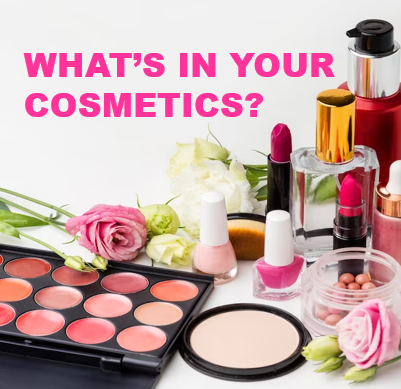Buyer Beware of the Synthetic Deceptions

Behind the Greenwashing: Synthetic Compounds and Their Side Effects
In the quest for healthier, more natural products, consumers often turn to labels proclaiming "all-natural" and "organic". However, beneath the guise of these appealing terms, a disconcerting reality looms. Many products, ranging from cosmetics to food and supplements, contain synthetic ingredients that sneak their way into our lives under the pretense of being wholesome and beneficial.
It’s crucial to understand and be well-educated about these potentially harmful ingredients and the associated risks. Reading labels and conducting research on supplement brands, as well as your everyday goods, can be essential in promoting health-conscious decisions that align with your values and expectations. My goal in this article is to make you aware and be empowered to make informed and healthier choices.
Let’s expose these deceptive practices, shedding light on the synthetic intruders that undermine our well-being. We'll also talk about their side effects, ensuring you are equipped with the knowledge needed to make informed choices in the marketplace.
The Path To A Healthier, Safer Lifestyle Begins With Awareness!

It's important to be mindful of what you consume. Read food labels to make informed choices. Opting for whole, unprocessed foods and organic options can reduce exposure to potentially harmful ingredients. Additionally, consulting with a healthcare professional or registered dietitian can provide guidance on your specific dietary needs and sensitivities.
Artificial Sweeteners (e.g., Aspartame, Saccharin, Sucralose): These sugar substitutes are often added to “diet” or low-calorie products to make them taste sweeter without the added calories of sugar. However, they have been linked to various health concerns, including potential associations with weight gain, headaches, metabolic disturbances, and gastrointestinal issues which have an adverse effect on the gut microbiome.
Artificial Colorings (e.g., FD&C Red #40, Yellow #5): Artificial colours are used to enhance the visual appeal of products. Many of them have been associated with hyperactivity in children and have raised concerns about their potential carcinogenic properties. Natural alternatives, like fruit or vegetable extracts, are safer choices.
Preservatives (e.g., BHA, BHT): These synthetic preservatives are added to extend the shelf life of products and prevent spoilage. Also, some studies suggest that BHA and BHT may be linked to cancer, as they are known to have antioxidant properties that can disrupt normal cell functions.
Preservatives and Sulfites: Sulfites, such as sodium metabisulfite and potassium bisulphite, can trigger asthma-like reactions in some people. They are often used to preserve dried fruits and wine.
Artificial Flavourings (e.g., Vanillin, Ethyl Butyrate): Artificial flavours are used to mimic the taste of natural ingredients. They can contain chemicals and additives that have not been thoroughly tested for safety. Such additives may trigger allergic reactions and adverse health effects in some individuals.
High-Fructose Corn Syrup (HFCS): HFCS is a sweetening agent that is often used in processed foods and beverages. Consuming excessive amounts of HFCS has been linked to obesity, diabetes, and other metabolic issues. It can also lead to increased cravings for unhealthy, high-calorie foods.
Sodium Nitrate/Nitrite: Sodium nitrate and nitrite are common preservatives in processed meats, like bacon and hot dogs. When exposed to high heat during cooking, they can form compounds called nitrosamines, which have been associated with an increased risk of certain cancers.
Artificial Trans Fats (Partially Hydrogenated Oils): Trans fats are used to improve the texture and shelf life of many processed foods. These fats are known to raise LDL cholesterol (the "bad" cholesterol) and increase the risk of heart disease.
Monosodium Glutamate (MSG): Found in many processed foods and restaurant dishes, MSG can cause "Chinese restaurant syndrome" including short attacks of weakness, numbness, palpitations, headaches and nausea attributed to overconsumption of MSG.
MSG Analogs: Ingredients like autolyzed yeast extract, hydrolyzed protein, and yeast extract can contain glutamate compounds similar to MSG and may cause similar reactions in sensitive individuals.
Carrageenan: Found in some dairy alternatives and processed foods, carrageenan has been associated with digestive issues in some individuals.
Potassium Bromate: This flour improver is banned in many countries but may still be used in some baked goods. It has been linked to cancer in animal studies.
Pesticide Residues: Non-organic fruits and vegetables may contain pesticide residues, which can be harmful if consumed in large quantities.

It's essential for consumers to research and be cautious about what they put on their skin. The effectiveness and safety of cosmetics can vary widely, so reading ingredient labels, considering your own skin sensitivities, and researching brands and products can help you make more informed choices. **Most labels list the highest percentage ingredients first.
Fragrances (Parfum): Many products contain undisclosed fragrances, which can cause skin irritation, allergies, and even respiratory issues for some individuals. Look for products that use natural essential oils for scent.
Parabens: Parabens, such as methylparaben or propylparaben, are used as preservatives in cosmetics. They have been linked to hormone disruption, skin irritation, and potential health concerns.
Phthalates: These chemicals are often found in fragrances and can cause hormone disruption, reproductive issues, and skin irritation.
Sodium Lauryl Sulfate (SLS) and Sodium Laureth Sulfate (SLES): These foaming agents are found in many shampoos and cleansers and can be skin and eye irritants. Long-term exposure may lead to more severe health concerns.
Formaldehyde-Releasing Preservatives: Ingredients like DMDM hydantoin and quaternium-15 release formaldehyde, a known human carcinogen, and can cause skin irritation and allergies.
Mineral Oil and Petrolatum: These are often used as moisturizing agents in skincare products but can clog pores and exacerbate acne in some individuals.
Synthetic Colors (Dyes): Artificial colourants can cause skin sensitivity and allergies in some people. Look for products that use natural colour sources like fruit or vegetable extracts.
Bismuth Oxychloride: Found in some mineral makeup, bismuth oxychloride can cause skin irritation and acne-like reactions in sensitive individuals.
Talc: In powdered cosmetics, talc may contain asbestos, a known carcinogen. Choose talc-free alternatives.
Retinyl Palmitate: Often used in anti-aging products, this form of vitamin A can make the skin more sensitive to UV radiation, potentially increasing the risk of sunburn and skin damage.
Propylene Glycol: This ingredient can cause skin irritation and allergies in some individuals.
Toluene: Commonly found in nail polish, toluene can lead to headaches, dizziness, and potential developmental issues in pregnant women.

When considering dietary supplements, it's essential to research the ingredients, choose reputable brands, and consult with a healthcare professional, especially if you have specific health conditions, are taking medications, or are pregnant or nursing. Dietary supplements can have health benefits when used appropriately, but safety and quality are paramount.
Titanium Dioxide: Often used as a whitening agent in supplements, titanium dioxide nanoparticles have raised concerns about their potential harm to the liver and other organs. While it's used in many products, it's best to choose supplements that do not contain this additive.
Magnesium Stearate: This common flow agent is used to prevent ingredients from sticking together during manufacturing. However, it can potentially hinder the absorption of the supplement's active ingredients, reducing its effectiveness.
Silicon Dioxide (Silica): While silica is a naturally occurring compound found in the earth's crust, it's often used in supplements as an anti-caking agent. High levels of silica intake may lead to respiratory and digestive issues, making it a concern for long-term health.
Cellulose and Microcrystalline Cellulose: While cellulose is generally considered safe, it can sometimes be derived from wood pulp, which may not align with the expectations of those seeking all-natural or organic supplements. Look for products that specify plant-based cellulose sources.
Hydrogenated Oils: Trans fats, often listed as hydrogenated or partially hydrogenated oils, are detrimental to heart health. They may be used in supplements as a filler or to improve texture, so it's important to avoid products containing them.
Artificial Colors (e.g., FD&C Red #40, Yellow #5) and Flavors (e.g., Vanillin, Ethyl Butyrate): Some all-natural or organic supplements may still contain artificial colours and flavours. These additives can have adverse health effects, such as allergies and hyperactivity in children. Look for supplements that use natural colours and flavours, derived from fruits and vegetables.
Caramel Color: Caramel colour is a common food and supplement additive used for colouring. Some forms of caramel colour may contain 4-methylimidazole (4-MEI), which has been associated with an increased risk of cancer.
Artificial Sweeteners: Some all-natural or organic supplements may still contain artificial sweeteners like aspartame, saccharin, or sucralose. These sweeteners, as mentioned earlier, have raised concerns about their potential impact on health, such as weight gain and metabolic disturbances.
Carrageenan: Carrageenan is a common thickening agent used in some supplements and dairy alternatives. It has been associated with gastrointestinal inflammation and digestive issues, making it a controversial additive.
Gelatin: Gelatin is often used as a capsule material in supplements, but it's derived from animal collagen. For vegetarians and vegans, it's important to choose supplements with plant-based capsules or alternative delivery methods.
Soy Lecithin: Soy lecithin is often used as an emulsifier in supplements. While it's generally considered safe, it's important to be aware of its source. Non-organic soy may be genetically modified, and some people have soy allergies or sensitivities.
Polysorbate 80: An emulsifier often used in supplements can potentially disrupt gut microbiota and contribute to inflammation. Some individuals may experience allergic reactions to it.
Potassium Sorbate: Potassium sorbate is a preservative used to extend the shelf life of supplements. It may cause allergic reactions in some individuals and has been associated with digestive issues.
Ephedra and Ephedrine: These stimulants have been associated with serious health risks, including heart attacks and strokes. Ephedra-containing supplements have been banned in some countries but may still be available in others.
Yohimbe: This herbal supplement is sometimes used for weight loss and erectile dysfunction. It can cause side effects such as increased heart rate, anxiety, and high blood pressure.
Kava: Used as a natural remedy for anxiety and stress, kava has been associated with liver toxicity. Some countries have banned or restricted its sale.
Comfrey and Coltsfoot: These herbs have been linked to liver toxicity and are not recommended for consumption.
Germander: Used in some traditional herbal remedies, germander can cause liver damage and should be avoided.
Chaparral: This herb has been associated with liver and kidney damage and is banned in some countries.
Things To Keep In Mind About Supplements:
Artificial Fillers and Binders: titanium dioxide, talc, Microcrystalline Cellulose, Silicon Dioxide (Silica), and Magnesium Stearate to name a few, may be associated with potential health concerns, so it's important to look for supplements with minimal or no artificial additives. Read the non-medical ingredients on the labels at the back of the package.
Synthetic Vitamins and Minerals: may not be as readily absorbed and utilized by the body, and some people may experience digestive discomfort when taking them. Try to stick with natural or whole-food-based supplements.
Herbal Supplements Contaminated with Toxins: some can be contaminated with harmful substances such as heavy metals, pesticides, or microorganisms. It's essential to choose supplements from reputable brands that conduct rigorous quality testing.
High Doses of Individual Vitamins or Minerals: excessively high doses of specific vitamins or minerals can lead to imbalances and adverse effects. For example, excessive vitamin A intake can be toxic, leading to symptoms like dizziness, nausea, and blurred vision. Consult a medical professional if you are unsure about what you read on the label.
What Are You Without Your Health?

Buyer Beware! Your health Depends On It!
As consumers, we must be vigilant in scrutinizing the labels of products claiming to be "all-natural" or "organic". Be aware of these potential additives, especially if you're seeking products that truly align with your health and dietary preferences.
It is often very difficult to find products that are void of the extensive list above.
Therefore, it's important to note that the presence of these ingredients doesn't necessarily mean a product is harmful. Consumers should be aware of the potential side effects and evaluate their own preferences and sensitivities. Always read ingredient labels paying close attention to the ratio of good vs. bad ingredients and how it can affect YOU depending on the dosage.
Deceptive marketing practices can lead us down a perilous path, exposing us to harmful synthetic ingredients that threaten our well-being. Understanding the side effects associated with these impostors is crucial for making informed choices and safeguarding our health.
The path to a healthier, safer lifestyle begins with awareness, so remember: Buyer Beware! Your Health Depends On It!

This Avocado Tree community would love to read your feedback. If you enjoyed this article tell us your thoughts on how the information helped you in the member discussion section below! Login or Subscribe to comment.
Member discussion